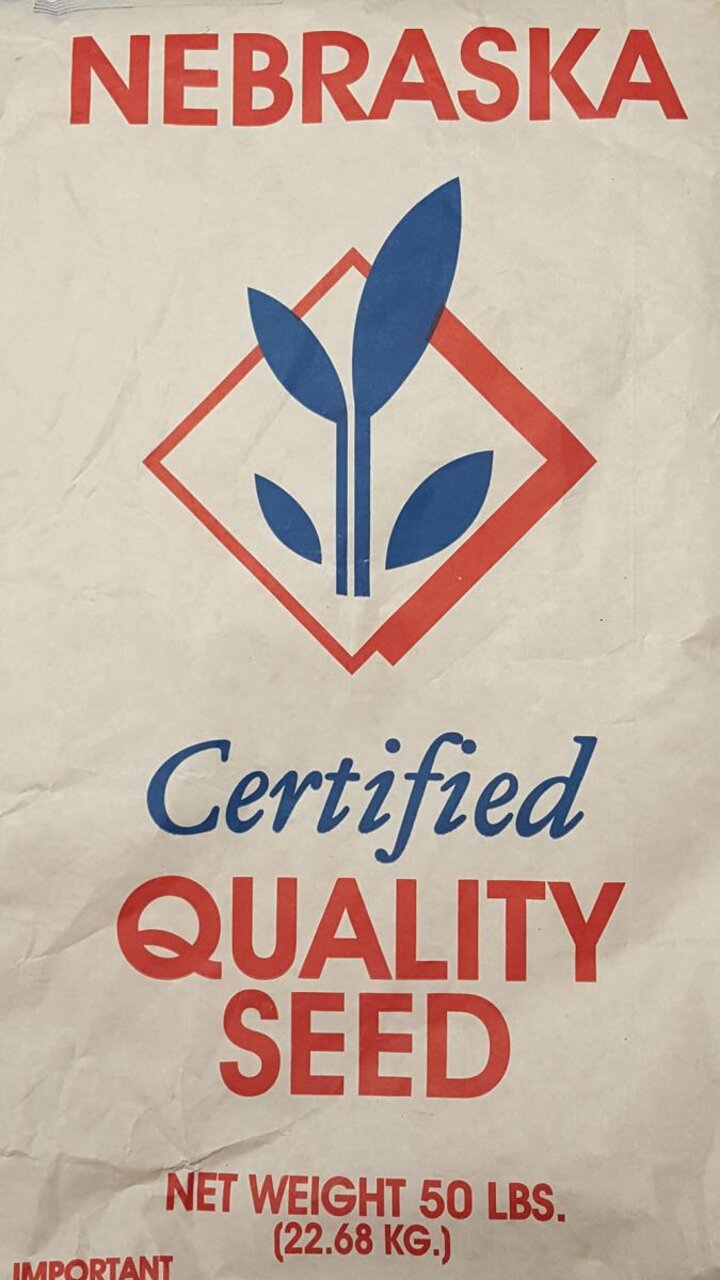During times of low commodity prices and economic hardship, producers often evaluate their inputs to identify areas where they can reduce expenses. Seed cost is one input that is considered, as all inputs should be.
Currently, most wheat varieties can be saved by the producer and used the following year for planting. This historical practice is still popular among many wheat producers. In some cases, however, a producer has signed an agreement to not save the seed of a particular variety for planting and this must be honored.
Producer-saved seed can be categorized into three categories of non-certified seed:
- bin-run seed is the most common and is not cleaned, treated, or tested prior to planting;
- custom-cleaned bin-run seed has been cleaned or conditioned in a way to improve its quality;
- treated custom-cleaned bin-run seed.
Certified seed is defined as wheat seed that has passed field inspection and testing standards for varietal purity. The Nebraska Crop Improvement Association tests and certifies wheat seed to assure it meets quality standards and publishes the results and a list of seed providers in their 2017-2018 Nebraska Certified Seed Book.
The benefits of certified wheat seed are well established:
- genetic purity: you can be assured of exactly what you are planting;
- clean seed: certified seed has strict limitations on weed and other crop seeds allowed;
- seed quality: uniform size and few damaged kernels enhances uniformity, vigor, germination, and establishment;
- lower disease incidence (see The Importance of Certified, Fungicide-Treated Wheat Seed); and
- increased yield potential.

Yield Advantage
Research has shown that with these benefits and the latest genetics found, certified wheat seed will almost always outperform bin-run seed. The 1985 Georgia Crop Improvement Association Small Grain Drill Box Survey found certified wheat had a 3 bu/ac advantage over bin-run seed, resulting in a $6.75 per acre return over the cost of the seed. The same survey found 62% of grain sampled from the drill box had severe seed damage and varietal purity problems. Another study found yield increases of 3.5 bu/ac in 1987 and 1.2 bu/ac in 1988 when using certified wheat seed over bin-run seed (Knudson, M. and L. Hansen, 1991, Intellectual Property Rights and the Private Seed Industry, U.S. Department of Agriculture, Economic Research Service, Agricultural Economic Report Number 654).
Graybosch and Peterson reported annual genetic yield gain of nearly 1% from 1959 to 2008 in winter wheat (Genetic Improvement in Winter Wheat Yields in the Great Plains of North America, 1959-2008; 2010). Recently released varieties have the latest disease resistance packages and greatest yield potential. Progress is made every year and certified seed gives producers access to the most recent genetics.
Bin-run Seed Has Costs
The cost of certified seed is often cited as the reason producers choose to use bin-run seed; however, bin-run seed also has direct and indirect costs. When comparing costs between certified and bin-run seed, be sure to consider hidden costs of bin-run seed. See Table 1 as an example of how to calculate the cost of bin-run seed.
Most certified seed is being sold at $9 per bushel this year. That is more than the estimated $4.50 per bushel cost of the bin-run seed, but those numbers don’t represent a fair comparison. One must also consider that certified seed has a yield advantage and is often seeded at a lower rate because of its quality. For example, if the seeding rate of certified seed is only one bushel per acre and it has a three-bushel-per-acre yield advantage, certified seed would have a break even return ($9.00 – $9.00 (3 bushel at $3.00) = $0.00). This is better than having a cost of $5.40 per acre. Lastly, when planting certified seeds, there is less chance of also unintentionally planting seeds of troublesome weed species.
Implications
The price spread between bin-run seed and certified seed is not as much as one would expect. Most years, higher returns should be expected when using certified seed. Additional benefits include: bin storage can be used for other grains or purposes; less labor and handling is required, and peace of mind that the seed is what you think it is, has high quality, and will have fewer disease and weed issues.
| Item | Cost ($/bu) |
|---|---|
| Bin-run seed | $3.00 |
| Storage | $0.15 |
| Cleaning | $0.50 |
| Damaged kernels* | $0.50 |
| Handling (labor) | $0.35 |
| Total | $4.50 |
| Average seeding rate | 1.2 bu/ac |
| Total cost (per acre) | $5.40 |
| *Damaged kernels refers to seed removed during the cleaning process that otherwise would have been sold. | |
Using certified seed will provide wheat producers the greatest return most of the time. Although the initial cost might seem prohibitive, consider using certified seed this year. By purchasing certified seed, producers are also indirectly investing in the development and selection of new wheat varieties. Refer to the Nebraska Extension 2017 Fall Seed Guide to select a variety that is well adapted to your area. Refer to the 2017-2018 Nebraska Certified Seed Book to find the closest dealer with the selected variety.

